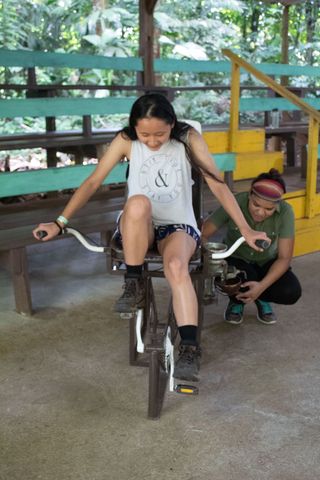How to Handle Stress on a First Year Abroad Program
First year abroad programs are seriously amazing. Yet, like anything, they can come with some challenges and learning curves. After all, you are exploring an unfamiliar country with its own customs and norms and starting college while doing it – a brand new experience all on its own.
There will be some stressful moments during your First Year Abroad program, but that doesn’t mean you won’t have the time of your life. Learning how to handle stress as a student will come in strides, and CIEE will be here to support you every step of the way. You got this!
Difficulties in Study Abroad
A First Year Abroad program is an exciting new step on your college journey. However, like starting college on a U.S. campus, there will be a lot of newness; you’ll be surrounded by new people, adjusting to a new class schedule and academic expectations, and learning more about yourself along the way. It can be overwhelming.
When doing all of this in a new country, there are even more unique challenges. And remind yourself: you’re courageous for taking it on, too! Give yourself some credit.
Read More: First Year Abroad: The Low Stress Option vs. The College Admissions Process
What are some common difficulties in study abroad?
- Homesickness
- Language barriers
- Balancing academics and fun
- Adapting to a new class schedule and academic expectations
- Cultural misunderstandings
- Time zone changes
We want to provide you with these common challenges because they’re just that: common. Other people alongside you on a First Year Abroad adventure will likely be experiencing similar situations and feeling stressed. And it’s all totally normal.
Let’s take a closer look at how you can handle some of these more stressful experiences as a student abroad.
Read More: First Year Abroad: More Than Just Great Food and Fun Travel
Coping with Stress as a Student
No matter what challenge or difficulty you’re facing, there are various ways to handle stress as a student. In fact, bookmark this page for the future, even after your First Year Abroad program, because you can apply most of these tips to any stressful situation.
Tip #1: Exercise and movement.

Exercise, even simple movements like walking or stretching, can help reduce stress significantly. When you partake in physical activity, it increases the production of endorphins in your brain, the stuff that makes you happy, and even decreases the output of adrenaline and cortisol, the stuff that makes you feel anxious or stressed!
Next time a particular assignment might have you feeling stressed, or you have some butterflies before a cultural excursion, try moving to help you feel better. Go for a walk around the city with friends, try a yoga class from YouTube, or even do something more intense, like weightlifting at your local gym. No matter what form of exercise you want to do, know that it will help reduce your feelings of stress.
Tip #2: Communicate with your teachers and friends.
If you’re feeling particularly stressed about your academics, one of the best things you can do is communicate with your professors.
Stay after class to see if they can provide one-on-one support and let them know if you’re struggling with a particular topic or assignment. They know you’re studying in a new place, and they are there to help you.
Connecting with a study buddy may help, as well! Work on projects together or bounce ideas off one another and keep each other accountable. Plus, studying with a friend in your new favorite café or restaurant is a lot more fun than going it alone.
Tip #3: Sleep.

We know – studying abroad is so exciting! You want to get out there and discover as much as you can: the food scene, nightlife, landmarks and sites, and tons more. But if you don’t get some rest, you likely might overdo it and feel stressed.
Set up a nighttime routine that you look forward to in the evenings and one that will help you get some much-needed rest. Check out a few tips for good sleep:
- Keep your bedroom dark and quiet before bedtime
- Try not to scroll on your phone right before bed
- Avoid a large meal immediately before getting some shut-eye
- Try sticking to a sleep schedule that works for you
Getting plenty of rest will help you manage stress abroad (and anywhere, really!).
Tip #4: Connect with people back home.
If you’re feeling homesick or overwhelmed while abroad, connecting with some familiar people back home can help you manage stress. Some familiarity and comforts from home can help you deal with all the newness of a study abroad program.
Tip #5: Listen to your body and know when to take a break.

The key to coping with stress as a student is identifying it before becoming overwhelmed. Once you start identifying signs of stress, you can better manage it. Sometimes, stress can manifest physically and go beyond just a feeling; you might have aches or feel more tired than usual.
As soon as you start feeling signs of stress, no matter how it appears, know when to take a break and engage in an activity that can help you relieve it, like many of the steps mentioned above. Listening to your body is fundamental to managing stress long-term.
While stress is inevitable during a study abroad trip, you don’t need to let it consume you. By following these practical and simple tips for coping with stress as a student, you’ll be able to enjoy your study abroad program to the fullest – we can’t wait for you to get started!

